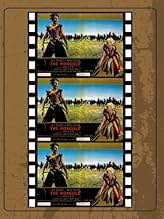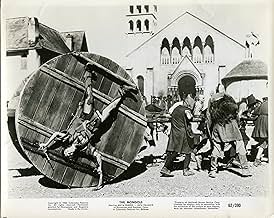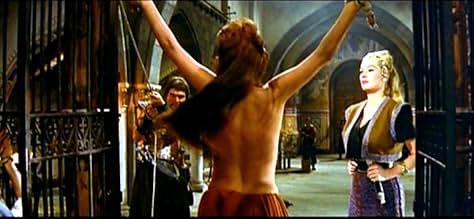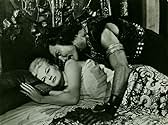During the Mongol invasion of Poland, a conflict between Mongol Emperor Genghis Khan and his oldest son Ogotai ensues when the former aims for peace and the latter itches for war and conques... Read allDuring the Mongol invasion of Poland, a conflict between Mongol Emperor Genghis Khan and his oldest son Ogotai ensues when the former aims for peace and the latter itches for war and conquest.During the Mongol invasion of Poland, a conflict between Mongol Emperor Genghis Khan and his oldest son Ogotai ensues when the former aims for peace and the latter itches for war and conquest.
Lawrence Montaigne
- L'aleato di Stefano
- (as Lawrenc Montaigne)
Mario Colli
- Boris
- (uncredited)
Andrej Gardenin
- Fencer
- (uncredited)
Janine Hendy
- La danzatrice nell'harem
- (uncredited)
Storyline
Did you know
- TriviaPopularized by John Green's Crash Course YouTube series (three-second raid scene) every time he uses the phrase "The Mongols".
- GoofsDuring an invasion of the Mongols a character is seen dressed in a sleeveless jacket defending another nailed to a wheel. Ogotai (Jack Palance) drags him down with his whip, only this time the character has lost his sleeveless leather jacket, and is wearing only a wide shirt.
- ConnectionsFeatured in Crash Course: World History: The Agricultural Revolution (2012)
Featured review
This was one of a number of low-brow peplums about ancient warrior tribes made in the wake of THE VIKINGS (1958) – this one even boasted a similarly rousing score by that film’s same composer, Mario Nascimbene. Others in this vein included THE COSSACKS (1960), THE TARTARS (1961) and ATTACK OF THE NORMANS (1962) – the latter being the only one in the bunch that I’ve watched, though I did lose the first one a couple of times on Italian TV.
Actually, this one turned out to be pretty good – and, I have to say, it lived up to the review on “Stracult” where special reference is made to its sequences of bloodthirsty action and sadism. Jack Palance gives the role of Ogotai – son of Asian potentate Genghis Khan – his eye-rolling all; he’s abetted by an equally evil Anita Ekberg (the mighty but battle-weary Khan himself perishes by her hand!). The unhistorical narrative involves the Mongols’ raid of Poland and, in particular, the attempts by one of the latter’s leading figures (Franco Silva) to negotiate a peace treaty with the Khan – a plan which Palance vehemently opposes and constantly schemes to thwart.
Being a relatively low-budget effort, the triple directorial credit might seem surprising: however, as the Italian credits themselves clearly indicate, this translates to being “A Film by Andre' De Toth” (implying that he was merely engaged in a supervisory capacity), “Directed by Leopoldo Savona”, and “Battle Sequences Staged by Riccardo Freda”. With this in mind, there are fewer of the latter than one would perhaps have appreciated – but these are nonetheless handled with the requisite gusto and grandeur. The rest of the film is largely taken up by various court intrigues on both sides of the fence but also a three-way Polish romance involving the aforementioned Franco Silva, Antonella Lualdi and Pierre Cressoy that tends to swamp Palance’s troubled relationship with his own wife!
As I said, the violence is really at the fore in this film – the Mongols themselves are memorably introduced on horseback dragging a statue of the Virgin Mary through the streets of a Polish city they’d just ransacked; besides, there are plenty of floggings (Ekberg herself lends a hand in the punishment of the perennially imperiled Lualdi), crucifixions (two men are even tied to the wheels of an advancing cart!), burnings at the stakes, etc. The finale, then, sees an Alexander NEVSKY (1938)-type strategy at work with the apparently fleeing Silva and his men luring the pursuing Mongol forces into a deadly swamp. The film was good enough almost to merit a *** rating from me…but, at 115 minutes, it’s quite a long haul – especially since it resorts too often to contrived (and repetitive) plotting.
Actually, this one turned out to be pretty good – and, I have to say, it lived up to the review on “Stracult” where special reference is made to its sequences of bloodthirsty action and sadism. Jack Palance gives the role of Ogotai – son of Asian potentate Genghis Khan – his eye-rolling all; he’s abetted by an equally evil Anita Ekberg (the mighty but battle-weary Khan himself perishes by her hand!). The unhistorical narrative involves the Mongols’ raid of Poland and, in particular, the attempts by one of the latter’s leading figures (Franco Silva) to negotiate a peace treaty with the Khan – a plan which Palance vehemently opposes and constantly schemes to thwart.
Being a relatively low-budget effort, the triple directorial credit might seem surprising: however, as the Italian credits themselves clearly indicate, this translates to being “A Film by Andre' De Toth” (implying that he was merely engaged in a supervisory capacity), “Directed by Leopoldo Savona”, and “Battle Sequences Staged by Riccardo Freda”. With this in mind, there are fewer of the latter than one would perhaps have appreciated – but these are nonetheless handled with the requisite gusto and grandeur. The rest of the film is largely taken up by various court intrigues on both sides of the fence but also a three-way Polish romance involving the aforementioned Franco Silva, Antonella Lualdi and Pierre Cressoy that tends to swamp Palance’s troubled relationship with his own wife!
As I said, the violence is really at the fore in this film – the Mongols themselves are memorably introduced on horseback dragging a statue of the Virgin Mary through the streets of a Polish city they’d just ransacked; besides, there are plenty of floggings (Ekberg herself lends a hand in the punishment of the perennially imperiled Lualdi), crucifixions (two men are even tied to the wheels of an advancing cart!), burnings at the stakes, etc. The finale, then, sees an Alexander NEVSKY (1938)-type strategy at work with the apparently fleeing Silva and his men luring the pursuing Mongol forces into a deadly swamp. The film was good enough almost to merit a *** rating from me…but, at 115 minutes, it’s quite a long haul – especially since it resorts too often to contrived (and repetitive) plotting.
- Bunuel1976
- May 24, 2008
- Permalink
- How long is The Mongols?Powered by Alexa
Details
- Runtime1 hour 45 minutes
- Aspect ratio
- 2.35 : 1
Contribute to this page
Suggest an edit or add missing content




























